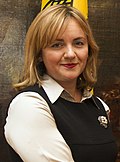Pre-history
The ministry was established on 1 February 1944, as the People's Commissariat of Foreign Affairs of the Moldavian SSR. It would later be renamed to the Ministry of Foreign Affairs of the MSSR on 27 March 1946.
He following have served as the foreign ministers of the Moldavian SSR:
The Council of People's Commissars in subsequent decades, exercised leadership in the MSSR's foreign relations with foreign nations. At the same time, the post of Minister of Foreign Affairs was often concurrent with the post of Chairman of the Council of Ministers (Prime Minister) of the Republic. During its existence, Moldova had representatives only in the Hungarian People's Republic, with the entire apparatus only consisting then of several people. The highest recognition the ministry received was on 23 November 1983, when Foreign Minister Comendant spoke at a meeting of the UN General Assembly. According to the 1978 Soviet Moldovan Constitution, the international rights of the MSSR were reduced in comparison with the amendments of 1944. [2] [3]
This page is based on this
Wikipedia article Text is available under the
CC BY-SA 4.0 license; additional terms may apply.
Images, videos and audio are available under their respective licenses.











